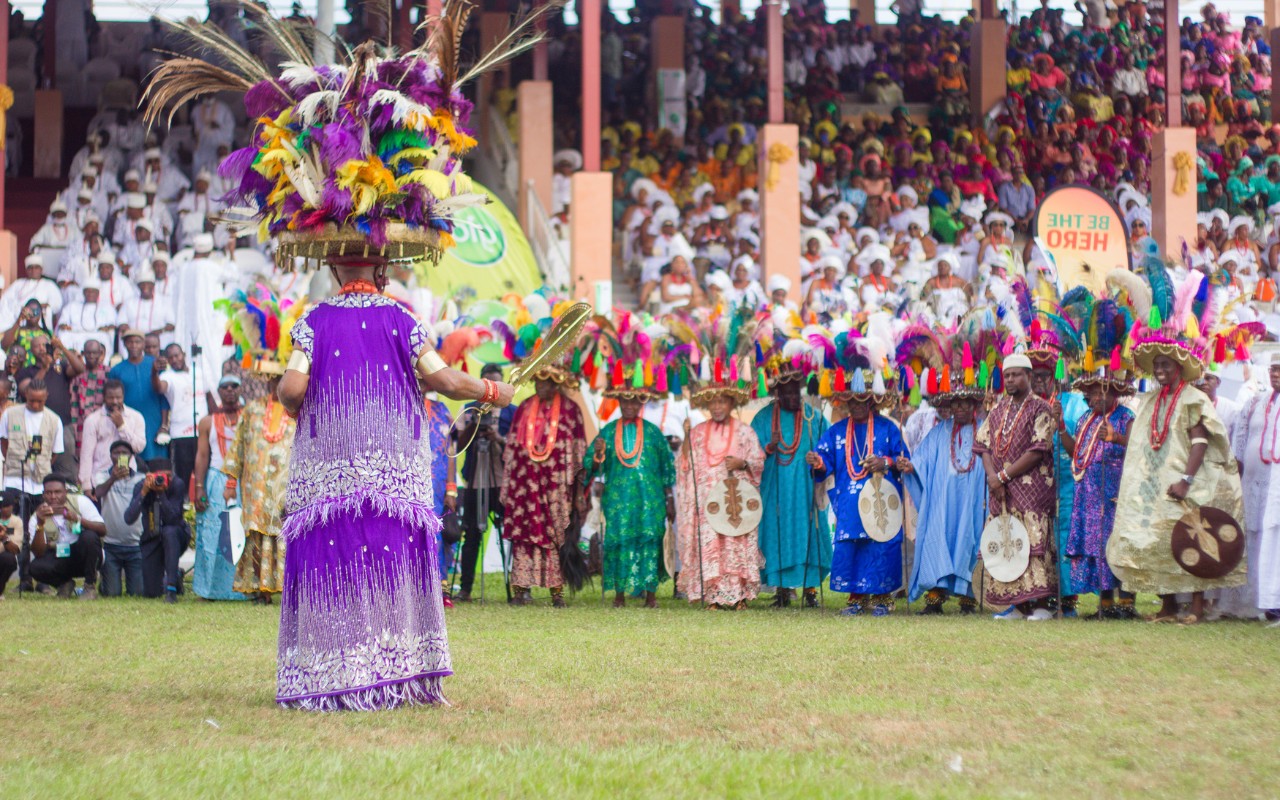The Ofala Festival, also known as a Renewal Ritual for any Igbo King, is one of the biggest cultural festivals celebrated by the Igbo people in the South-eastern part of Nigeria. Ofala is a combination of two Igbo words, ‘ọfọ’ and ‘ala,’ which mean authority and land, respectively. Hence, Ofala means the Authority of the Land.
The authority of the land in the Igbo tribe is the king. A king is because of the ọfọ, which is the Igbo’s symbol of authority. There is no general king in the Igboland, but each kingdom has a king who is referred to in a range of titles: the Obi in Onitsha, Ezeuzu in Awka, the Eze in Enugu-ezike, the Igwe in Nnewi, the Agaba Idu in Izhia and the Eze in Enugwu-ukwu who is also the Igwe of the Umunri clan.
Every king in Igboland celebrates the Ofala festival annually, as it is an important renewal ritual of the authority of the land, being the king. Ofala festival is usually celebrated in October, but there are slight variations across the Igbo Kingdom, in the name, month and ritual. In some Igbo kingdoms, it is Uyo Afa, Igu Aro and celebrated in December or January. The most renowned Ofala festival in Igboland is the Ofala Onitsha which is believed to have been the first Ofala. However, it is similar to Ofala festivals in other kingdoms.
Before the Ofala Onitsha, the Obi of Onitsha embarks on a one-week retreat known as the Inyedo ukwu na nlo eze onicha - to put the feet in the king's place. In this period, he is in seclusion from the public and undergoes spiritual purification for himself and the good of his community. When the King performs the Inyepu ukwu na nlo, an emergence from seclusion, the Ofala begins. In October 2024, HRM Igwe Nnaemeka Alfred Achebe, CFR, (Agbogidi) successfully marked his 22nd Ofala festival while being the 21st Obi of Onitsha.
Because the monarch does not make casual appearances due to his spiritual role as head of the kingdom, the Ofala is a celebration of his presence among his people and also a symbol of successful spiritual negotiations for his people. The festival is celebrated for two days as Iru Ofala and the Azu Ofala. The first day, the Iru Ofala is precisely for the monarch. He parades and his subjects watch him dance. In this phase, cannon shots or guns precede the Obi’s dance. Then the Obi parades in three sessions and dances to war drums. Intermittently, his subjects, well-wishers and stakeholders pay him homage.
On the second day, Azu Ofala, different age grades dress in different colours and dance while paying homage to the king. On this day, the king may give chieftaincy titles to deserving individuals of his kingdom. The significance of the festival includes the renewal rites of the king, reenactment of the celebration of yam as a valuable food and a bonding festival between the king and his subjects where the king prays for and blesses them.
The Ofala is celebrated from the coronation of a king till his death. The Ofala celebrated in his death is called the Last Ofala. The Igbo people believe their kings do not die, so the Last Ofala is to bid the king farewell as he embarks on a spiritual journey to join his ancestors. The Ofala festival is similar to the Igue Festival in Beninland.
References:
Ofala Festival – Ofala Onitsha Festival
Photo credits:
RexClarke Adventures
NgwoRocks
Punch Newspaper
Christopher Maduewesi

